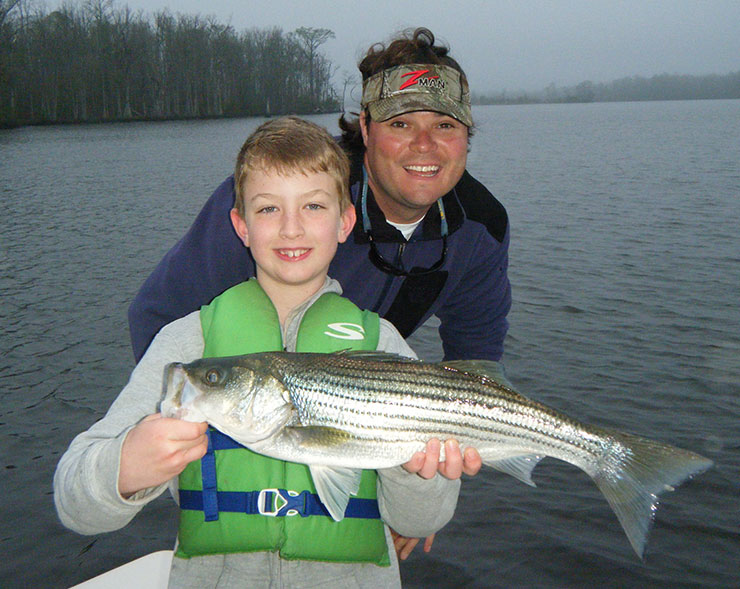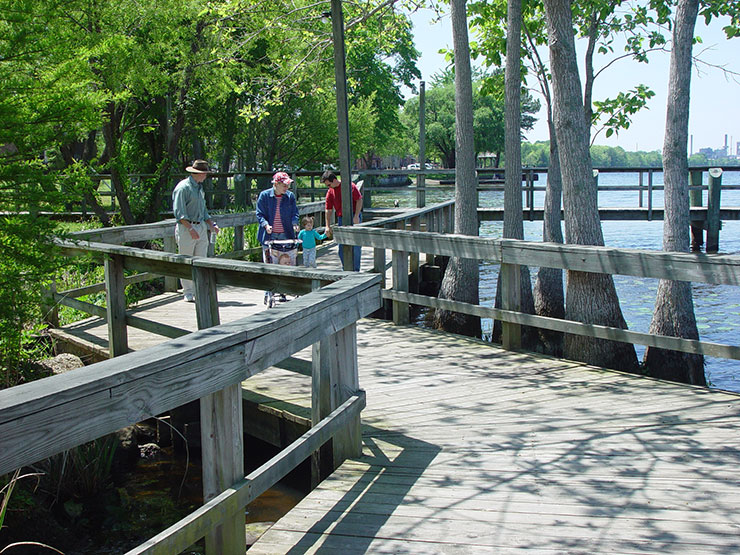People-First Tourism: Connecting with Nature’s Bounty

If your idea of connecting with nature involves encountering lions and wildebeests on safari in exotic lands, stop reading now.
On the other hand, read on if you opt to connect with people whose tourism ventures embrace the natural environment — ecology, culture and history — of places a bit off well-worn paths.
Researchers at North Carolina State University’s Department of Parks, Recreation and Tourism Management developed People-First Tourism to boost the number of rural tourism entrepreneurs — and enhance rural economies.
“Many coastal communities are in transition from traditional agriculture economies to something very different. Few long-term, well-paying jobs come with gentrification trends. We designed People-First Tourism to assist individuals interested in being involved in nature-based tourism enterprises,” explains Duarte Morais, NC State faculty member, and the project’s designer and coordinator. Morais’ team includes doctoral candidates Chantell LaPan and Yuchen Mao.
It’s a win-win situation, according to Jack Thigpen, North Carolina Sea Grant extension director.
“Tourists are eager to get in touch with the natural environment. Local folks are the ones who are most vested in the ecology, history and culture of any given locale. So it makes sense to help provide the tools that can lead to new economic opportunities for individuals and communities,” Thigpen explains.
Sea Grant provided seed money to help Morais and his research team conduct fieldwork in rural communities in the Inner Banks region to gain an understanding of the challenges fledgling entrepreneurs face.
“These are places that tourists now typically pass through en route to Outer Banks attractions,” Morais points out.
But Morais hopes to change that by building a strong People-First Tourism network to attract visitors to the region. The Inner Banks, a term describing coastal plain counties around the Albemarle-Pamlico estuarine system, has untapped potential for natural resource-based tourism, he asserts.
At community meetings hosted by his team, prospective entrepreneurs learn about services available through local community colleges, county Cooperative Extension offices, regional economic development centers, established tourism organizations and natural resource management agencies.
LEVERAGING RESOURCES
Lentz Stow, executive director of Beaufort County Community College’s Small Business Center, is a People-First Tourism advocate.
“I see this as a way to bring ideas and concepts together to help produce new entrepreneurs. The bottom line is job creation through micro-entrepreneurship,” Stow says. “It may mean an additional income stream to supplement the household income.”

Small business centers at community colleges across the state offer a series of how-to seminars, from writing business plans to recordkeeping and reporting taxes, Stow points out.
“Cash flow and cost factors are what it’s all about. We teach new entrepreneurs to keep score and win the game,” he says, noting that his program builds upon the basics.
People-First Tourism’s efforts to promote the Inner Banks as a tourism destination are a definite plus.
“We have impoverished pockets in scattered river towns between I-95 and the ocean. Many are struggling and have hurdles, but also have assets in their pristine natural resources. However, many communities don’t have the money needed to advertise and market those assets and few state or local dollars to develop infrastructure,” Stow says.
That’s where People-First Tourism networking can pay off by leveraging resources of a large university like NC State, small business centers, community colleges, faculty know-how, and students who bring energy and ideas into play.
Advertising via websites and social media could help package the region’s nature-based tourism assets and services, Stow adds.
“People-First Tourism can provide the window for a view of Inner Banks,” he explains, citing a desire that the estuarine region earn recognition similar to the national identity for the Outer Banks.
Most towns east of I-95 include or border bodies of water. “Those water resources — and the rich history surrounding them — could become the connecting element for marketing the Inner Banks as a tourism destination,” Stow notes.
STAYING TO PLAY
To be sure, Inner Banks towns, such as Bath, Columbia or Washington, give travelers a reason to stop — to eat lunch, visit folk art galleries, or walk through history along a picturesque waterfront — while en route to the Outer Banks.
But People-First Tourism entrepreneurs want tourists to come, explore and stay in the Inner Banks region.
“We want our region to be the destination, not just a stop along the way,” says Capt. Richard Andrews, who wants people to know the Inner Banks are “open for business year-round.”
Andrews, who owns and operates Tar-Pam Guide Service out of Washington, participated in People-First Tourism workshops in Beaufort County in early 2012. He was impressed with the idea of building a support network for microentrepreneurs.
“I thought it was a way to learn and do more to expand my own business, to encourage others, and to share resources for marketing the Inner Banks as a tourism destination,” Andrews explains. “I definitely want to be part of an initiative that promotes our region.”
He believes that collaboration and cooperation will mutually benefit fledgling nature-based businesses. It’s what he calls “the logic of generosity,” a successful model he observed while working several seasons aboard charter fishing vessels out of Hatteras Village and Oregon Inlet Fishing Center.

“The charter boat captains support each other and work for the common good of the fleet. They radio each other when they find a good offshore fishing area as a way of spreading the wealth of shared resources. Spreading the wealth means spreading tourism dollars through the whole network,” Andrews says.
It’s about a high tide raising all boats. And, it’s a model Andrews is emulating in the fourth year of his Inner Banks fishing operation. He shares information with other fishing guides, and recommends locally owned restaurants and bed-and-breakfast accommodations to encourage his clients to stay and play.
It seems that Andrews was destined to do what he loves best. Born and raised in Tarboro, Andrews began fishing in rivers, estuaries and offshore waters as a youngster. He says the day after he graduated from the University of North Carolina at Chapel Hill, he headed to the Outer Banks to fulfill his lifelong dream of working as a mate on an offshore charter boat.
Those experiences whetted his appetite to learn more about the coastal environment, leading to a master’s degree in natural resources from NC State, where he focused on stream and wetland ecology.
Andrews brings that store of knowledge to bear as a fishing guide on the Pamlico, Pungo and Tar rivers, as well as the Pamlico and Albemarle sounds.
He can launch his boat at any site and travel to where the fish are running year-round. And, it helps that he understands the dynamics of rivers and estuaries, and how fish behave in response to stream dynamics and seasonal changes.
“What the old timers will tell you is that fish track food. Period. That’s just about the most important thing you need to know,” he says. “I have so much respect for the old timers who have generations of knowing how to read the waters passed down to them. I had to earn a couple of degrees to come to that basic knowledge. I am earning my stripes on the water. There is no substitute for being on the water.
“While his business is all about “putting people on fish,” there are no guarantees that the fish will take the bait. What Andrews can guarantee, though, is an opportunity to connect with nature and learn a bit about complex wind-driven tides and the dynamics of estuaries, as well as local wildlife, geology, traditions and history.
“I love what I am doing and where I am doing it,” he says. That doesn’t mean his entrepreneurial spirit is quelled. He continues to build his client base with an Internet presence and Facebook postings. He also writes for several fishing publications, including Fisherman’s Post and Coastal Angler.
Andrews’ dream is to build a multifaceted, nature-based enterprise that offers guided fishing trips, nature tours and hospitality at his own rustic, riverside lodge.
GROWING INTEREST
Ben Davis, Andrews’ friend, shares an entrepreneurial spirit, a love for the region and a determination to make the Inner Banks a tourist destination.
The Leggett Farm, just outside of Washington, is the centerpiece of his long-term vision to establish a bed-and-breakfast on the homestead that has been in his family for more than 150 years. His organic farm would supply all the needs for guests, while continuing to provide top-notch organic food for the wider community.
For now, his People-First Tourism focus is the Leggett Organics Farm operation he founded nearly a decade ago. This is his third season as part of the Community Supported Agriculture, or CSA, network. Members purchase shares prior to each growing season and are guaranteed a weekly box of organic vegetables or other farm products.
Members may come to the farm and pick their own produce, or pick up their weekly share at Greenville or Washington farmers’ markets where Davis sells his products.
Visitors to the Leggett Organics Farm website can watch the crops grow, and learn about the latest activities and offerings. A resident chef posts images of staff-tested recipes that feature the current season’s crops.
Leggett Organics Farm also offers farm tours, festivals and other social events on the farm for the CSA members. The public also is encouraged to “tour and taste.”
“They are ways to develop knowledge of how their food is grown,” Davis says. “And what visitors learn is that we are doing 1950s-era farming. We don’t own huge tractors, and the fertilizer comes courtesy of chickens and cows.”
A UNC-Chapel Hill alumnus, Davis founded, owns and operates an environmental consulting firm.
“That’s my day job,” he jokes. “But I had an opportunity to come back to the farm about 15 years ago and began farming conventionally as a hobby. When the chemicals made me sick, I decided, ‘No more.’ Since then, I have invested in converting the entire acreage to strictly organic methods.”
To earn U.S. Department of Agriculture Organic Certification, farmers must meet rigid standards and be recertified annually, Davis explains.

He started organic farming on a small scale, growing for friends and family members. The operation now yields seasonal crops of a variety of greens, root vegetables, herbs, corn, peppers, eggplants, squash, melons and even cut flowers, as well as 10 acres of collards.
His dad, semi-retired pediatrician Edward Davis, is adding a new dimension to the farm’s offerings. He is tending four beehives near the edge of planted rows of crops. It will be a couple of years before they can harvest honey. In the meantime, the elder Davis is overseeing a new brood of chickens that one day will provide organic eggs.
Heirloom tomatoes are always in demand, says the younger Davis. He recalls an earlier season of planting about 100 varieties of heirloom tomatoes to test what worked best in the local climate and what best suited the locals’ taste buds. He’s whittled the selection down to about 50 varieties. This year, his favorite is the Sungold cherry tomato that Davis claims actually tastes like the sun.
“Organic farming produces food that is safe to eat, free of harmful chemicals. And, importantly, fresh organic food just tastes better,” Davis says.
As part of the People-First Tourism project, Davis hopes to expand his role in the farm-totable movement by helping to develop a network of organic farms in Beaufort County that supply fresh produce to local restaurants.
CONNECTING THE DOTS
“We planted seeds of interest that are beginning to germinate into a network of fledgling enterprises that are part of our pilot phase,” People-First Tourism’s Morais says.
“We want to put them in the marketplace well prepared to meet the challenges of a small business. It’s important to know how to negotiate the maze of business plans, credit, licensing, liabilities and marketing,” he adds.
“Our newly launched People-First Tourism website is designed to look and feel like other tourism reservation sites. It allows tourists to research and make reservations with rural tourism entrepreneurs who have, thus far, been difficult to find and contact,” Morais explains.
For now, the site provides profiles and contact information of about 20 participating entrepreneurs. Along with Andrews and Davis, the site features fellow Beaufort County entrepreneur Capt. Bob Boulden. He owns Miss Bea Charters, a service that offers nature cruises on the Tar and Pamlico rivers, and the picturesque creeks that provide habitat for myriad wildlife in the water and on the shore.
An economic innovation grant from the N.C. Rural Center is enabling Morais to expand the project to rural counties beyond the Inner Banks. He envisions adding as many as 100 to 200 entrepreneurs to the network from across the state.
“We expect the People-First Tourism website to become a prime resource for tourists interested in connecting with North Carolina’s people and natural resources. The project stands to improve the tourist appeal of North Carolina, to enable the self-reliance of numerous entrepreneurs, and to increase appreciation for the state’s rich natural resources,” Morais concludes.
For more information, visit People-First Tourism at: www.peoplefirsttourism.com.
Also, find Capt. Richard Andrews at: www.tarpamguide.com; Ben Davis at: www.leggettfarmorganics.com; and Capt. Bob Boulden at: www.missbeacharters.com.
North Carolina State University supports the Small Business and Technology Development Center at: www.sbtdc.org. The N.C. Community College System runs the N.C. Small Business Center Network at: www.ncsbc.net.
This article was published in the Autumn 2012 issue of Coastwatch.
For contact information and reprint requests, visit ncseagrant.ncsu.edu/coastwatch/contact/.
- Categories:


